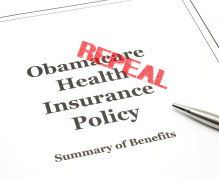It has now been five years since President Obama signed Obamacare into law — and more than two years and two months since any poll found it to be popular. The last time a poll found Obamacare to be popular was during Obama’s first term.
During his second term (now mercifully more than halfway over), Real Clear Politics has listed 178 polls on Obamacare. All 178 have found it to be unpopular. In addition, the Kaiser Health Tracking Poll — a left-leaning outlier that RCP doesn’t even list and which (contrary to essentially every other poll) actually claimed Obamacare was popular at the time of its passage — has released 22 polls on Obamacare during Obama’s second term. All 22 have found it to be unpopular. So, in all, Obamacare has gone 0-200 during Obama’s second term, far worse than the cumulative 0-124 record of #16 seeds in the NCAA Basketball Tournament.
It’s not hard to figure out why. The good people of this country didn’t want Obamacare because they knew it would undermine their liberty, their nation’s fiscal solvency, and the quality of American medicine. They knew it would raise health costs while also increasing federal spending, deficits, and control. They knew it would funnel unprecedented power and money to politicians and bureaucrats in Washington at the expense of doctors and patients on Main Street. And, indeed, it has.
Yet Obama says of his namesake,
“On the five-year anniversary of the Affordable Care Act, one thing couldn’t be clearer: This law is working, and in many ways, it’s working even better than anticipated.
“After five years of the Affordable Care Act, more than 16 million uninsured Americans have gained the security of health insurance.”
In truth, when the Democrats rammed Obamacare into law without a single Republican vote, the Congressional Budget Office projected that 26 million people would have gained health insurance by 2015. Only the federal government could call failing to hit a target by 10 million people “working even better than anticipated.” Moreover, most of those 16 million have merely been dumped into Medicaid.
Still, the ongoing public opposition to Obamacare is really quite striking. Imagine if 200 straight polls had found Obamacare to be popular. In that scenario, do you think the cause of repeal would continue to be taken seriously? Why, then, in the face of 200 straight polls finding Obamacare to be unpopular, is its repeal not viewed to be nearly inevitable?
The truth is that if Republicans show half the determination to repeal Obamacare in 2017 that Obama did in imposing it upon an unwilling citizenry in 2010, Obamacare will be repealed. The only thing holding back the cause of repeal is this: Most Americans were not content with the pre-Obamacare status quo, and — five years later — they’re still waiting for Republicans to unite around a well-conceived conservative alternative.
Polling last fall by McLaughlin & Associates (on behalf of the 2017 Project) found overwhelming support for repeal in the context of a viable conservative alternative. With “a conservative alternative that aims to lower health costs and help people get insurance” in play — in other words, with an alternative in play that focuses on both costs and coverage — the poll found that 60 percent of likely voters supported repeal, compared with only 32 percent who supported letting Obamacare stay on the books (whether “in its current form or in amended form”). Among independents, the tally was 62 to 26 percent in favor of repealing rather than keeping/fixing Obamacare. (The poll included 38 percent Democrats and only 32 percent Republicans.)
Last fall, the 2017 Project’s “Winning Alternative to Obamacare” — which Ed Gillespie championed and which he credits with having helped him almost pull off a huge upset in Virginia — was scored by the nonpartisan and politically neutral Center for Health and Economy (co-chaired by center-right former CBO director Doug Holtz-Eakin and left-leaning Princeton economist Uwe Reinhardt). The Center for Health and Economy’s scoring found that the 2017 Project’s alternative would save $1.1 trillion in federal spending over ten years versus Obamacare, reduce premiums, increase access to doctors, and result in 6 million morepeople having private insurance than under Obamacare. (More people would be covered overall under Obamacare, but only because Obamacare would dump an extra 12 million people into Medicaid.)
McLaughlin & Associates subsequently asked likely voters, “Would you support or oppose repealing and replacing Obamacare with a conservative alternative that would save $1 trillion, reduce premiums, enhance access to doctors, and increase the number of people with private insurance by 6 million, but would cover 6 million fewer people overall because fewer people would be on Medicaid?” Among all respondents, 59 percent said they’d support repealing Obamacare and replacing it with such an alternative, while only 26 percent said they’d oppose doing so. Even among Democrats, 49 percent said they’d support repealing and replacing Obamacare with this alternative, while only 37 percent opposed that notion.
Some center-right commentators have inexplicably given up on repeal and are instead calling for fixing and expanding Obamacare. Meanwhile, some aspiring politicians are insisting that, contrary to public opinion, Obamacare alternatives should focus on costs and ignore coverage. Either of these approaches will all but guarantee that Obamacare will be with us forever.
But if Republicans will do what the Democrats have refused to do since that fateful day five years ago — namely, listen to the American people and give them what they want — if they will unite around an alternative that focuses on costs and coverage while moving things in a conservative direction from the pre-Obamacare status quo — they can repeal Obamacare in early 2017. As 200 consecutive polls suggest, there’s no reason why Obamacare should ever celebrate its seventh anniversary.
© 2015 Weekly Standard LLC. Reprinted with permission.
